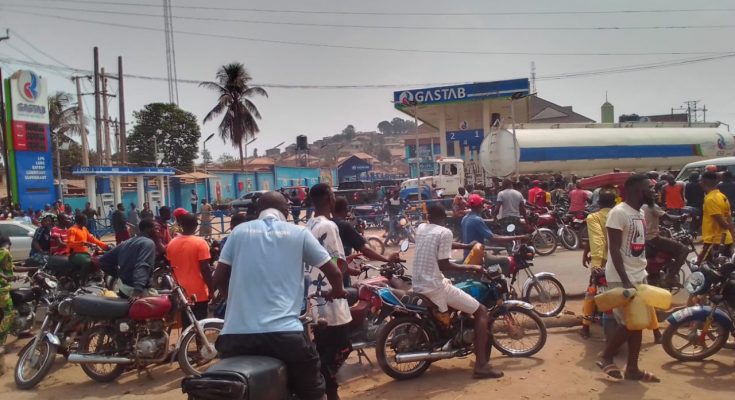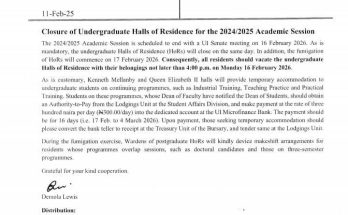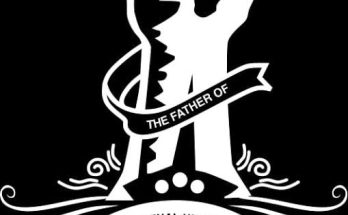By: Awóṣùsì Olúwábùkúnmi Abraham
No one knows the importance of freedom until it is presented to you in a bowl of choices.
Little did everyone know that what seemed to be for a while was going to last weeks. But are we alien to this issue? No—we’ve known different phases of suffering, and this? It’s a common type that we experience every year. These days, we even look forward to it like the way we look forward to the first rain of the year after months of hellish heat.
Amidst the University lecturers riding on the triumphant oxen of one month warning strike, and incessant insecurities making headlines, the country also silently slid into a fuel scarcity situation. For some, this is another way to thrive in schadenfreude.
Ìbàdàn, Nigeria — For a city named as the biggest in West Africa, one could have thought in a society like this, unlike others, the issue of petrol scarcity will be distributed on radio and television with the addition of social media banters. But neither was the reality, except few banters like that of a man who tweeted;
“One girl been wan cut queue,chance me. I no gree, next thing-• “It’s your type that beat women. Animal”
I just dey scream “I gree” as I take my position
Idiot think sey I left my beautiful wife since 5am to come allow her scruffy ass chance me for queue, because she get toto.”
— @Elkrosmediahub, Twitter, 2022
However, beyond the realm of banter and likes and tweets and retweets and comments and suggestions is the reality of every Nigerian. Hike of price of goods, and Darkness that has failed to leave to the surface even though God said, “Let there be light.”
At the inception of lopsided sales of petrol, the regulatory authority published a press release attributing the fuel scarcity to the detention of “methanol quantities above Nigeria’s specifications” in the imported petrol as the reason for the scarcity as it has proven harmful to equipment. Hence, a quick withdrawal of the contaminated petrol has been made which therefore is causing fuel scarcity.
And in order to contend for fuel either for transport or personal reasons, people quickly readjust to queuing in various filling stations and while some filling stations sell as soon as they open, others wait for the queue to form an endless stop, before it is ordered to be sold.
Hustling fuel between the needle’s eye
A Yorùbá apothegm says in translation form that whoever is going to eat from the honey in a rock must have a well sharpened axe. In the early morning February 28, 2022, while everyone was quickly dusting off their Bibles and getting ready to be renewed for the week, down in a corner in Orogún, one of the numerous communities in Akinyẹle Local Government, a young boy rinsed his face, picked a keg and went in search of fuel.
His first stop was at the Mobil filling station, Opposite the University of Ibadan, there, he met a queue of bike-men, cars and keg owners. He tarried for a while before he walked up to one of the workers in the filling station. The man, in his fifties pitifully noted, “they have failed to sell it. In fact, I have had a customer’s keg with me for the past three days, and they can’t even sell it to me, one of their own. Such a pity.”
He stayed around for some minutes listening to different comments about the fuel and how God doesn’t give a damn about fuel. Then he continued. Hoping to catch his church service which starts by 9:45 am. He flicked his almost-shut-down Nokia C20 and it displayed 8:30 am. Quite promising, he trekked back to Shokem, stopped a bus, and began another journey—Moniya.
The car jostled amidst traffic jams caused by parked cars at some filling stations along the road, the boy’s eyes glued on the road vigorously searching for a miracle. Somewhere. At the moment. He muttered a few prayers. Hoping to attend his church service.
After some ride which was proving abortive, he alighted and went to a closed filling station but with a promising queue. He stayed there, emptying his hopes. He left Radekaz Filling Station, and started trekking back. Money, they say, is the determinant of everything.
Finally, he stopped at GASTAB, where he stayed for many more minutes before he left.
Threatened Freedom At GASTAB
His eyes were glued to the nozzles pumping fuel inside the black vehicles. A man in a punk hairstyle kept gallivanting around the environment. Another man in a complete military uniform was at the entrance, looking at the hundreds of men outside like the way the Eagle looks at its prey from the mountaintop. Perhaps he’s an Eagle.
The man in the punk hairstyle, an Officer the boy would like to address as Kofo, came to the clustered section of the filling station where different people were expressing their grievances. He looked over at an old man whose voice never ceased from shouting;
“Make we take am easy. All of us na Nigerian. This Government jus dey but e go still better for us. As you see me so, Na ₦300 petrol I wan buy and I don reach here since 6 am.”
and ordered him in. After the clamour, he looked over at the people and signified that everyone be silent, then he began; “please and please, let’s respect ourselves. We will all get fuel but that means if we take it slow.” He left almost immediately and the murmuring resumed.
The soldiers kept ordering selected vehicles in, some were of those that followed them from barracks, while some were those of their officers. During this however, a bikeman stealthily entered the filling station.
How much pain can you take to get petrol?
It happened so fast. The bikeman was marched out by a soldier holding a chord whose edge was tied with three bolts.
“Get out!” The soldier commanded him.
Grudgingly he rode his bike outside while still being ushered by the soldier. Two men quickly transit into a dialogue behind the boy.
Man A: Do you know that if this soldier ever beat this bikeman, nobody will save him.
Man B: It’s a lie. People are angry. They will beat the Soldier. Have you forgotten EndSars?
Man A: That’s different—
Before the other man could say another thing, noises had risen among the people. The soldier’s face blazing hotter than Nebuchadnezzar’s furnace. He landed a stroke of the chord on the bikeman’s head and instantly blood started to gush out.
The bikeman held his head in pain, while other bikekmen began to rise their clamouring. Somewhere from the inside, Officer Kofo sighted the incident and came to the place immediately. He held the bike-men’s hand and led him inside. The soldier followed.
Man A: Do you see what I’m saying? Did people rise to challenge the soldier?
Officer Kofo came back minutes after. He asked for the wounded man’s bike and the soldier took it in and fuelled his tank.
Man B looked at no one in particular and exclaimed, “How much pain can you take to get petrol?”
He had hardly said that when Officer Kofo came back. His face totally changed.
“You bloody civilians,” he began. “You can’t even bear a few hours of queuing. I am laying my life for this country. I fought Boko Haram. I sustained injuries everywhere in my body,” he began to show them various gun wounds on his arms, back, upper butts.
“You see a soldier dressed in Uniform and you’re harassing him. Threatening that you’ll beat him. You’ve got guts!”
He had hardly finished when two convoys loaded with soldiers came.
Officer Kofo kept gallivanting around, “If you know you have the gut, say a word! You’ll see what will end you.”
Officer Kofo looked at the boy, “and you.”
The boy, scared for his life quickly replied, “Sir I didn’t say anything. I’m here just looking.”
One of the soldiers that just drove in followed Officer Kofo. He locked eyes with the boy;
“You, I will castrate you.”
The boy quickly replied, “sir, I didn’t say anything. In fact, my food is at home.”
He said this, picked his keg and left.




